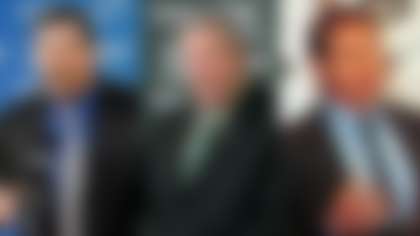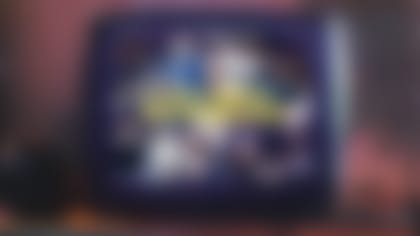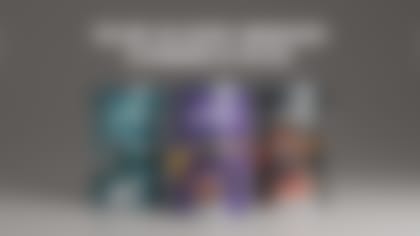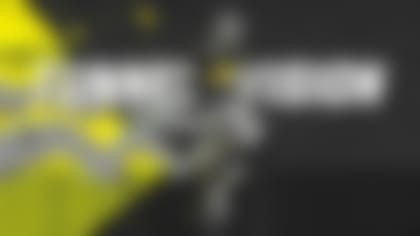Fifty years after coming through on his Super Bowl III guarantee, Joe Namath still knows how to command the attention that comes with being a cultural icon.
By Judy Battista | Published Jan. 4, 2019
EAST RUTHERFORD, N.J. -- He is at the center of a dimly lit maelstrom, like the bride at her own wedding, unable to sit down or take a drink or have a bite until a man finally pushes a glass of water into his hand. At a cocktail party in October, thrown to celebrate his finest hour, Joe Namath moves just a few steps inside the room, well short of the hors d'oeuvres and sushi bar arranged by the glass wall that offers a field-level view of MetLife Stadium. Many of Namath's old teammates are there nibbling, but as soon as the legendary quarterback's motion slows, a receiving line for his attention forms. Middle-aged men in suits and women of all ages in heels, his own teammates and their wives asking for autographs, all smiling and gaping and seeking a hug or just a moment in his electrified air.
A couple of yards from where Namath stands, the New York Jets, who make sure the Hall of Famer's picture is the first a visitor sees when pulling up to their training facility, set up photo areas so that those here to celebrate the 50th anniversary of Super Bowl III -- the players, sponsors and super fans who get invited to these kind of soirees -- can have something to commemorate the occasion. About two dozen members of the team are in attendance, some of the men already gone or too frail to travel, and everyone understands that this party is likely to be the final time so many of them will be together.
The players take turns posing beside the Lombardi Trophy they had won. But they, like everyone else that night, want the real trophy: a selfie with Namath. He poses for dozens of them, smiling for each, his arm slung around whoever leans in before the camera clicks, the green and white boutonniere fastened to his gray pullover eventually drooping from all the flesh it had pressed.
The host of the party, New York Jets CEO Christopher Johnson, finally gets in line, too.
"Trying to find a way into Joe," he says, neatly summing up the entire weekend of events.
It will be exactly 50 years on Saturday since Joe Namath's Jets transformed the NFL and he became the kind of cultural icon who compels billionaires to wait their turn to say hello. His shaggy black mane has lightened to gray-streaked brown and the young man's hunch in his back now inches toward a stoop. Namath wants to emphasize that, really, it was the defense, which forced five turnovers, that won that game. He would have voted running back Matt Snell, who had 30 rushes for 121 yards and a touchdown, the game's Most Valuable Player instead of himself. But Namath remains the kind of presence who rivets attention, the same way he did in that long-ago poolside press gathering days before he reached football immortality.
This is how Namath's life has been ever since the guarantee of victory and its stunning fulfillment in Super Bowl III, and those who have known him for that long marvel that the interactions always go about the same way. When his dinner in a restaurant is interrupted by someone approaching his table, Namath invariably stands and smiles and shakes the hand and takes the picture and then goes back to his cooling meal.
Namath now is at an age -- 75, incredibly -- that when you ask him how he is, he first mentions his health is good, his children's health is good, his grandchildren are healthy. The string of starlets has been replaced by his dates, daughter Jessica and granddaughter Jemma. On the red carpet, Namath pointed out to his Hall of Fame receiver Don Maynard that Jemma had lost her front tooth at school the day before.
Namath laces his flirtatiousness with wistfulness now, the warm lilt of his voice -- that curious mix of Alabama and Western Pennsylvania -- drawing everybody in. He still comments on the loveliness of a young woman with long blonde hair, but when asked a simple question about that singular Super Bowl Sunday -- was it the biggest day of his life -- the Broadway part of Joe Namath recedes and the Beaver Falls part takes over.
"Oh no. No," he says. "When I say, 'Oh no,' people can have different views. I can't say that. I've had big days. My children were born healthy. They're still healthy. I remember my mother and father. I remember being home. There were important days before that for me to even evolve into the team guy with the guys. Everything starts at home. There were as important, maybe even more important, days before that to be able to get me there.
"So out of respect, which starts at home, I think about how I got there. There are so many people I'm thankful for having been around. I've always known it's not about me, me, me, me, I, I, I, I. My family wouldn't let me think that way. Reality set in along the way that I know there is more to every day than just me."
Those who were there then remember Namath this way: shy, but outgoing, able to hit it off with all his teammates, many of whom were curious about the famous $427,000 contract he signed to play for the Jets in 1965, the record-setting rookie contract that so shocked NFL teams it pushed them toward a merger of the leagues. Namath's best friend growing up in Beaver Falls was an African-American, and he was at ease mixing with all the players, sitting at a different table for lunch nearly every day.
"He was the most down-to-earth, regular superstar," said the left guard for that team, Randy Rasmussen. "You've got to admit: He was a superstar."
The 1968 season was not Namath's best. The season before, he had passed for a career-high 4,007 yards and 26 touchdowns and -- typical for his high-risk, high-reward style -- 28 interceptions. The Jets failed to make the playoffs, finishing second in the AFL's East Division. In 1968, though, Namath threw for just 15 touchdowns and 3,147 yards. But the team started 7-2 before going to Oakland for a Nov. 17 game. The result, a loss, would be lost to history except for this: Nobody in New York saw the end. But they did see "Heidi" after the network switched away from the game.
"No one was aware of that happening until we were in the locker room after the game," remembers Frank Ramos, the Jets' former long-time public relations executive. "It was going crazy, [defensive assistant coach] Walt Michaels was so upset about the officiating, he's banging on the officials' door. [Head coach] Weeb Ewbank called his wife at home an hour after the game -- because the game had been taken away, she didn't know who won even. Heidi didn't mean anything to us."
The Jets stayed on the West Coast after the Oakland game and the following week played perhaps their finest game of the season in San Diego. At 8-3, they were so far ahead of the Houston Oilers in the East that they clinched the division title with three weeks left to play. New York was able to rest its starters, playing them only in the first half of the final three games.
Truth is, the Jets still believe their toughest game of the season was the AFL Championship -- a rematch with the Raiders. With family in town, Namath wanted to get away the night before. He told famed columnist Jimmy Breslin he went to the bar he owned, Bachelors III, and spent the rest of the evening at a hotel with a bottle of Johnnie Walker Red and a female companion. Many years later, he told the New York Daily News that Ewbank had told players to follow their normal routines before the game, and he had done just that.
The game was played in the wind and cold of the Jets' old home, Shea Stadium, and Namath remembers it as the toughest, most physical game he ever played. After one play, as he lay on the ground, he realized his finger was bent the wrong way. When he was sacked that day, he took a knee to his helmet and at halftime the trainer had to help him walk to the locker room. Ewbank told Namath's backup, Babe Parilli, he might have to play in the second half. In the locker room, doctors looked at Namath's head, and he got an injection in his finger and both knees.
The Jets had led most of the game, but a Namath pass got caught in the wind and was intercepted. The resulting Pete Banaszak touchdown gave the Raiders the lead with eight minutes left in the game. That set the stage for the greatest drive of Namath's career, better than anything he crafted in his controlled Super Bowl effort. He told his offense to be on alert for the audible if Raiders safety George Atkinson set up for bump-and-run coverage on Maynard. He did, and Namath went deep. The ball drifted in the wind and what was supposed to be a pass over Maynard's left shoulder ended up being caught by Maynard's outstretched arms to his right. It was, Maynard maintains, the greatest catch of his life. For the winning touchdown pass, Namath went to his fourth read -- Maynard, who was on his knees in the back of the end zone.
The Jets smuggled Champagne into the locker room, against AFL rules. The stage was set for the world championship game against the NFL's Baltimore Colts in Miami. Ewbank quickly made one of his biggest decisions, to take the team to Miami early. On the day before the AFL Championship, the Jets had been forced to practice in an armory in Flushing, New York. The players had to walk around tanks and trucks for the walk-through, because the field was frozen and covered. So, the Jets went to Miami 10 days ahead of the game because they would be able to get their work in there.
Ewbank was immediately criticized for the unorthodox decision, but he ran those practices like they were back in training camp. And he brought the players' wives and families down to stay in the team hotel.
"Weeb said, 'I'm going to work them out so hard, they won't want to go out anyway,' " Ramos said. "He thought, Who better to watch the players than their wives?"
There was no curfew until the Tuesday before the game, and Jets players voted that anybody who broke it would be fined $1,000.
The extra time in Florida meant the Jets had more days to hear about the superiority of the Colts, who were coached by Don Shula and were heavy favorites. The Colts had the NFL's second-ranked defense, had outscored opponents by 258 points in 14 regular-season games and, of course, had the luster afforded them by the older, more established league. The Jets were not impressed. Defensive tackle Paul Rochester was familiar with the Colts starting quarterback and the NFL's Most Valuable Player, Earl Morrall, because both had played for Michigan State. And he told his teammates that Morrall could not throw deep. Ewbank told Ramos he hoped the Colts blitzed because he knew the Jets could pick it up. On the Wednesday before the game, tight end Pete Lammons told Ewbank he should stop showing the team film because they were going to get overconfident.
"We respected the Colts because of their experience, especially, and on our side, we were just a young team," Maynard said. "But we knew the players we had would be able to beat them if we didn't make any mistakes."
Namath had been named the professional football player of the year and he -- along with some local high school and college players -- was to be honored at a banquet thrown by the Miami Touchdown Club that would benefit the Variety Children's Hospital. A son of one of the part owners of the Jets said he would throw a barbecue for the players on Thursday night, too. Namath told Ramos he could not go to the banquet because he wanted to be with the team. Ramos told him how important the charity was, that all the tickets had been sold because Namath would be there. Ramos told him he wouldn't want to disappoint all those people. Namath relented, but Ramos did not go with him.
The rest is the very best of Namath lore. Someone at the dinner told Namath the Colts were going to whip the Jets. His response wasn't anything that his teammates weren't already thinking.
"I like to think I know what I was saying all the time and I still say some things that I might not have given some thought," Namath says. "But spontaneously, on the spur of moment, somebody pushes a button, I react. There is a less-disciplined side I have -- it's called my Gemini, Gypsy or whatever side -- I've really grown to believe in that. I could shift gears. I was responding to a person who was a wise guy. I let him know what I felt. If it hadn't been for that wise guy, having had mentors ahead of me, we never bragged or said anything about what we were going to do. We might have felt that way, but it wasn't my way from the coaches I had. It was there, I was talking to HIM. And, maybe, to myself. I was talking to some people back home in New York at the time. To let them know what we were going to do."
There were only two writers at the banquet. The late New York Times writer Dave Anderson did not write about Namath's words because it was already well past the newspaper's deadline. Luther Evans did write a story for the Miami Herald, and there it was, with a headline on the front of the sports section: Namath Guarantees Jets Victory.
The next morning, there was to be a photo session with Shula and Ewbank at the press hotel in Miami Beach. On the rainy drive from the Jets' Fort Lauderdale hotel, Ramos showed Ewbank the Herald. He told Ewbank he should read the story.
"Dad gummit, we had them right where we wanted them," Ewbank said to Ramos. "Why did Joe say that?"
At the press conference, the first question to Ewbank was predictable: "What do you think of what your quarterback said?"
Ewbank responded "It ain't often my quarterback whistles Dixie."
But at the team meeting, Ewbank asked Namath why he had done it. His younger teammates were nervous about the comments because Ewbank had warned them not to say anything. But Namath's more veteran teammates knew he had said what they had all been talking about privately.
"Joe said, 'Weeb, they're in trouble if they need bulletin board material to get ready for this game.' " Ramos recalled.
There were other dramas to worry about anyway. Maynard was hurt, although he joked that he could run faster hurt than most people could healthy. He would mostly be a decoy in the game, though. And center John Schmitt, to whom Namath remains close, had caught pneumonia after the Oakland game. Nobody knew because the Jets didn't want the press to find out, so they could not allow Schmitt to be laid up during the week. Worse, the Jets thought Schmitt was allergic to penicillin. On the Thursday before the game, the same day as the guarantee, Schmitt told Ewbank that if he was not given penicillin, he would not be able to play. He could barely walk. So, he took the medicine and played.
On Sunday afternoon, Namath and his longtime roommate, Jim Hudson, walked out of the locker room onto the Orange Bowl field before the game. They stood in the end zone. Four years earlier, on the same field, they had faced off as opponents in a similar-feeling game: Alabama vs. Texas.
"I looked at Jim," Namath recalled, "and said, 'This is our kind of game, buddy. This is a big game.' "
Until last November, Namath, amazingly, had never even seen the game that, still, defines the word "upset". He had watched highlights of course, of a game that is remembered for the Jets being 18-point underdogs. He saw Snell's 30 runs for 121 yards -- the backbone of the offense that day. And the four interceptions of Morrall and the great Unitas. And of his famous trot from the field with his index finger wagging. At training camp the next year, the Jets had looked at the film cut-ups. But until last fall, when he watched it start to finish as he was working on a book, Namath had never seen one of football's most famous -- albeit not one of its best -- games, had never seen, in full, the breadth of the Jets' domination, how they had held the ball for 36 minutes and 10 seconds, and taken a 16-0 lead on the powerful Colts.
He had not seen what the nation had watched in shock -- that the Jets had not just beaten the Colts, but demolished them, shattering the myth about the superiority of the NFL in the process.
He did not even realize until he watched the broadcast that the game was already called the Super Bowl by then. The small gold ring with the centerpiece of diamonds in the shape of a football reads: World Champions. Namath wears it only on special occasions.
"You just reminded me I wanted to apologize to our receiver, Bake Turner, because when I watched the film, on the iPad, I didn't even realize I threw such a poor pass to Bake," Namath said. "Don had an injury and he left the field. Bake came on and the first play was strong left and Bake's wide out to the right and they come with a free safety blitz and Bake is wide open. I throw it in the ground; he couldn't even dive for it. If he catches that ball, he puts one move on, he runs for a touchdown. To that day, I didn't know that. I swear to you on my momma's grave, I did not know that play existed. I missed him. And Bake could have taken that and run for a touchdown.
"I saw some things in the game that brought me down. I didn't realize I played as poorly as I did from time to time."
Namath was 17 of 28 for 206 yards that day. But he was careful. The derring-do of his usual style was under control. There were no mistakes. It was a game dominated by Snell and the defense. If it paled in comparison to the epic 1958 NFL Championship Game, when the Colts defeated the Giants in a contest that is still considered the NFL's greatest, Super Bowl III remains one of the landmark events in league history. Namath used to say he didn't realize the Jets were going to win until the final gun went off, but when he finally watched the game, he felt it when the defense came up with a stop with about two minutes remaining.
"I started to believe we were going to do it," Namath said. "But I didn't dare allow myself to say we did it. It wasn't over. I wouldn't allow myself to think it. Not until it was BOOM."
In the locker room, Pete Rozelle, who had just watched the upstart league beat his NFL, grasped almost immediately how important the moment was.
"He said, 'This is what we're trying to sell. Competitiveness,' " said Joe Browne, the NFL's long-time public relations executive.
Namath was catapulted to a level of sports and entertainment stardom that few athletes had reached to that point. His guarantee remains a touchstone still, with all subsequent ones -- and they seem to come every year now -- somehow falling short. He was an icon, then and now, a player so larger than life that former Secretary of State Condoleezza Rice could not wait to meet him when he once visited the Oval Office with an NFL contingent.
"I wasn't stunned -- I didn't think about it," Namath said of becoming a pop-culture figure. "I lived it. Every day was different. I remember being asked about being a superstar, the first time I was ever asked about it. I said, 'Excuse me -- my brother is a superstar. Nobody has ever given him anything. He's had to work his whole life. He's put three children through college. He's a superstar to me.' He had to get out and work. It wasn't a matter of making a big score. To me, that's a superstar. We know what a superstar is nowadays. To me, parents are the real superstars who raise children the right way."
Namath spends most of his time in South Florida now, raising money for his foundation, which does work for children's charities and neurological research. He hosts a wildly popular golf tournament in Long Island each year, where droves of Hall of Famers turn out to help him raise more money. And he just completed his autobiography, "All the Way: My Life in Four Quarters", which comes out in May.
"A million things," he said. "A thousand things in football, and I go back: shoulda, woulda, gotta eliminate -- those kinds of things. I would have done some things differently, not just in football but outside of football. Fortunately, I'm still here. We're still growing, I'll keep trying to play a better game of life."
A few hours before the Jets threw their party in October, they hosted a quieter gathering, just the former Jets players and the current ones at the team's walk-through in their New Jersey fieldhouse. That Super Bowl banner is still the only one the Jets have, and although Namath tried to hang back, the young players wanted to shake his hand. There was an obligatory picture with Sam Darnold and Josh McCown, the latest inhabitants of the job Namath defined.
The Jets wanted to move the Lombardi Trophy from the sideline to the middle of the field so that the 1968 team could recreate a team photo. They wondered how to transport the hardware that is typically handled by security men wearing white gloves.
Someone suggested that Namath carry the trophy onto the field.
When he was asked, Namath demurred.
"Have Gerry and Don do it," he said of his old teammates Philbin and Maynard. "They're the senior guys. Maybe one day I'll be the senior guy."
The twinkle returned a few minutes later, after each of the team members posed alone holding the trophy.
Namath was the last to go. He stood for a moment, then reared back, as if he was going to throw that silver football one more time. There was a gasp of surprise and then laughter. The sounds Namath has heard all these years.
_____________________________________________________________________












